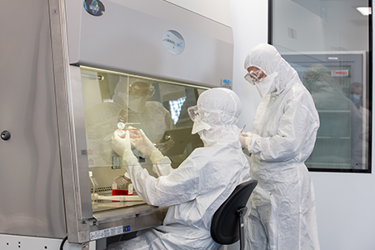Manufacturing Automation For Cell & Advanced Therapies

Since 2003, we have helped more than 50 cell and advanced therapy companies across the globe translate their unit process steps into GMP controlled manufacturing processes on automated equipment in disposables. We understand the market and have a proven process for designing and implementing a viable plan that will allow you to seamlessly transition your cell-based therapy to commercial-scale manufacturing.
Seamlessly transition from clinical to commercial-scale
Strategic Planning & Feasibility
We help translate your process from the lab bench to commercial-scale, by integrating appropriate manufacturing techniques as a complete ‘needle-to-needle’ system. This begins by undertaking an in-depth review, conducting a comprehensive risk assessment, and performing a cost of goods analysis to establish the commercial feasibility of the therapy production options.
Next, we identify the most suitable manufacturing system for your specific therapy and develop a strategic plan to transition to the preferred approach by considering the following factors:
- The total cost of therapy as production volumes increase
- The available commercial-scale processing technologies that can be deployed
- Short-term requirements, including clinical trials, schedule, capacity and technical issues
- Long-term GMP scale-up plans, including volumes, timing and production strategies (including the potential use of a CMO and then the technology transfer to your own facility)
The selected process technologies and automation are integrated to match your budget and operational needs as they evolve through clinical trials and into manufacture.
Clinical Stage Development
During this stage, we assist with the design and implementation of the closed unit process solutions identified and selected during the planning and feasibility stage to enable comprehensive system testing at scale. The manufacturing system at this point will incorporate both manual, open process steps (in-process testing and media preparation are common examples) as well as automated, closed unit processes (for wash and concentrate, cell selection, expansion, final formulation, etc.).
For more automated systems, we can employ both standalone unit process operations and more comprehensive full process options. When designing and implementing manufacturing systems, we carefully consider and coordinate the human and facility interactions linking these therapy production processes.
Commercial-scale Manufacture
After use at the clinical-scale and promising Phase III clinical trial outcomes, the transition to commercial-scale manufacture is a relatively smooth path.For autologous therapies, the commercial manufacturing solution is a number of coordinated single-batch platforms, the primary consideration is the optimization of facility footprint and operator capacity to deliver a given throughput.
Allogeneic systems are tailored to suit the desired batch size, although scalability, the risk of large-batch failure and the desire for system redundancy can dictate a multiple-platform solution.
At commercial-scale, the ‘needle-to-needle’ manufacturing system is preferably integrated through a Manufacturing Execution System (MES) that coordinates Electronic Batch Records (eBR) allowing review-by-exception and significantly reducing supervisor workload. Modern MES frameworks allow extensive 21 CFR Part 11 compliant data management across the facility.
